|
|
|
Sort Order |
|
|
|
Items / Page
|
|
|
|
|
|
|
| Srl | Item |
| 1 |
ID:
132959
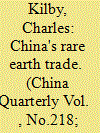

|
|
|
|
|
| Publication |
2014.
|
| Summary/Abstract |
Rare earth elements (REE) captured a startled world's attention during the 2010 Diaoyu/Senkaku Islands crisis, when it appeared that China withheld access to them during its border dispute with Japan. China asserts that its sovereign right to environmental regulation and national production quotas is unassailable. However, China's trade measures appear to be inconsistent with WTO rules, as well as with environmental protection and conservation, since they incentivize illegal mining and smuggling practices. In an upcoming case (DS431), the United States, the European Union, Japan and 16 third parties will argue before the WTO that China's trade measures on rare earths, tungsten and molybdenum constitute discriminatory behaviour and are illegal. This raises the question of whether China is inappropriately using the environment as a defence against allegations that its rare earth trade policies are in violation of its WTO obligations.
|
|
|
|
|
|
|
|
|
|
|
|
|
|
|
|
| 2 |
ID:
138751
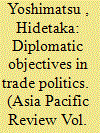

|
|
|
|
|
| Summary/Abstract |
This article seeks to analyze the development of free trade agreement (FTA) policies adopted by China, Japan, and South Korea with particular interests in the trilateral FTA. It seeks to address what the determinant factors that have conditioned the development of the trilateral FTA are. While the three governments began the informal joint study of the trilateral FTA in 2003, they pursued diverse trade strategies that disturbed a shift to formal negotiations. However, China's strategy to hedge against the US influence in East Asia became a catalyst in shifting from the long-lasting study stage to the launching of negotiations. Moreover, Japan's strategy to participate in TPP negotiations as a soft balancing against China through closer political linkages with the United States weakened China's and South Korea's willingness to engage in the trilateral FTA positively. Thus, the three countries’ commitments to the trilateral FTA were primarily confined by their specific diplomatic objectives responding to the political-economic evolutions in the Asia-Pacific region.
|
|
|
|
|
|
|
|
|
|
|
|
|
|
|
|
| 3 |
ID:
127060
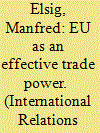

|
|
|
|
|
| Publication |
2013.
|
| Summary/Abstract |
Drawing on the European Union (EU) foreign policy literature on effectiveness, this article studies how the European Union chooses judges to serve on the World Trade Organization's key judicial institution: the Appellate Body. Conceptually, the article differentiates between effectiveness in representation and effectiveness in impact. The article shows how delegation to the European Commission has increased the strategic agenda-setting power for championing its preferred candidates. The article further compares European and US practice in nominating candidates. Overall, the article finds that effectiveness in representation has increased over time. In terms of effectiveness in impact, the article shows how the international environment conditions the EU's influence. The article also exposes the difficulties of studying the effectiveness of EU external relations due to the peculiar decision-making processes dominant in judicial bodies.
|
|
|
|
|
|
|
|
|
|
|
|
|
|
|
|
| 4 |
ID:
137187
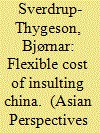

|
|
|
|
|
| Summary/Abstract |
In this article, I investigate trade relations between Norway and China after the 2010 Nobel Peace Prize was awarded to Liu Xiaobo, a leading Chinese dissident. It is a case study of China's political use of economic levers in its international relations. Concluding that Sino-Norwegian trade relationship did not suffer the severe impact that many predicted, I argue that the threshold for China to enact punitive economic actions seems higher than is often acknowledged. China's sensitivity is to the costs and benefits of the relevant country's trade.
|
|
|
|
|
|
|
|
|
|
|
|
|
|
|
|
| 5 |
ID:
127777
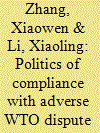

|
|
|
|
|
| Publication |
2014.
|
| Summary/Abstract |
Starting from 2004, China's trading partners, in particular the United States, have increasingly utilized the World Trade Organization (WTO) dispute settlement system (DSS) to challenge China's trade-related measures. As a major player in world trade, how China responds to adverse rulings is not only important to its trading partners, but also for the future of the international trade regime. China has thus far held a relatively good compliance record when facing adverse panel and/or Appellate Body rulings, except for the recent delay in full compliance in China-Publications and Audiovisual Products. Through examining the factors affecting China's decision making when targeted in a WTO dispute, this article finds that, in general, China is highly motivated to comply with the WTO DSS due to the reputational costs of noncompliance. Nevertheless, the recent delay in compliance in China-Publications and Audiovisual Products also demonstrates that successful implementation could be impeded by certain politically influential interest groups, especially when the measure at dispute is politically sensitive.
|
|
|
|
|
|
|
|
|
|
|
|
|
|
|
|
| 6 |
ID:
161362


|
|
|
|
|
| Summary/Abstract |
A range of socio-economic dislocations have spawned renewed interest in the capitalist system and its critiques. Within these trends, the politics of international trade has often been a flashpoint for civil society organisations (CSOs) concerned with social justice. This paper uncovers a neglected feature of this landscape: how, since the 1980s, certain CSOs have shifted from being ‘radical outsiders’ to ‘reformist insiders’ to protest the design and purpose of global trade. We know why CSOs have criticised the political economy of trade, but less about how they have historically struggled to gain admission into this policy milieu; their internal strategising and tensions; and what makes for effective protest. To understand such experimentation, this paper argues that literature on professionalisation offers a valuable lens for exploring the relationship between expertise and power. Dovetailing with other research in IPS, it adapts Bourdieu's comparatively underused concept of scientific capital to explicate how certain, prized dispositional qualities were acquired and practiced for the purpose of registering policy impact. This argument is developed through the case of Oxfam. When viewed historically, the paper suggests that a professionalised, activist subjectivity has emerged within certain CSOs, defined here under a new ideal-type notion of the ‘critical technician’.
|
|
|
|
|
|
|
|
|
|
|
|
|
|
|
|
| 7 |
ID:
179176
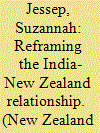

|
|
|
|
|
| Summary/Abstract |
For a country on track to have the world's largest population by 2030 and one of the world's largest economies by 2050, there is no doubt that India will be consequential for New Zealand. Even if the trade relationship is put aside, India matters. It is also true that the relationship is set to become more complicated, as India grows and seeks to put its own mark on world affairs. But differences aside, India and New Zealand are clearly of strategic value to each other: in the Indian Ocean region, in the Pacific, in the Quad and as members of the wider Indo-Pacific region where many of India's values and interests directly align with New Zealand's.
|
|
|
|
|
|
|
|
|
|
|
|
|
|
|
|
|
|
|
|
|